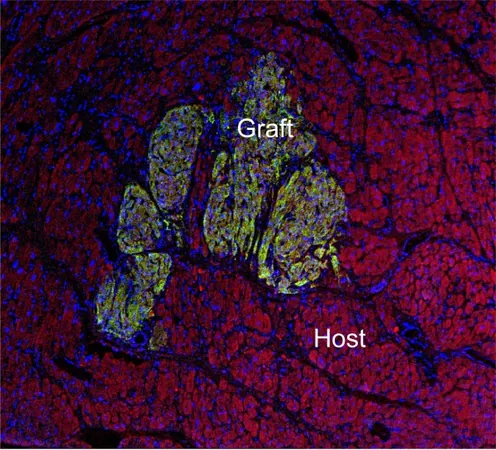
Breakthrough in Heart Disease Treatment: Human Stem Cell-Derived Heart Cells Show Promise in Monkeys!
2024-11-13
Author: Siti
In a pioneering study, researchers from the University of Wisconsin–Madison and Mayo Clinic have made significant strides in the battle against heart disease, showcasing that heart muscle cells derived from stem cells are safe and effective in treating monkeys with heart problems. This groundbreaking work, published in the journal Cell Transplantation, opens new avenues for potential treatments in humans suffering from congenital heart defects, a major contributor to heart disease—the leading cause of death in the United States.
Congenital heart defects, which can affect individuals from birth, often result in pressure overload in the heart, particularly impacting the right ventricle. This condition, known as right ventricular dysfunction, is especially prevalent among children who exhibit symptoms such as chest discomfort, breathlessness, and debilitating palpitations. If not addressed, it can lead to severe heart failure and may necessitate a heart transplant, a procedure complicated by the limited availability of donor organs.
Under the leadership of Dr. Marina Emborg and Dr. Timothy Nelson, the research team explored the use of grafts of cardiomyocytes—heart muscle cells grown from induced pluripotent stem cells (iPSCs)—as a complementary treatment to existing surgical methods. iPSCs are generated from human donor cells, reverted back to a stem-like state, and then developed into heart-compatible cell types.
The researchers transplanted these cells into rhesus macaque monkeys with surgically induced right ventricular pressure overload. The results were encouraging, as the transplanted cells successfully integrated into the monkeys’ heart tissue, providing essential support and functionality. The study also highlighted that while some monkeys experienced episodes of ventricular tachycardia (a rapid heart rate), these incidents resolved naturally within 19 days, underscoring the safety of the procedure.
"The findings from this study could be revolutionary. They indicate that stem cell treatments not only have the potential to support existing cardiac tissues but may also delay or wholly circumvent the need for heart transplants in affected individuals," states Jodi Scholz, the lead author of the study.
The promising integration of the stem cells into compromised hearts signifies a substantial step towards future clinical applications for treating congenital heart defects in humans. Macaques, due to their physiological similarities, have become invaluable in advancing research in stem cell therapies across various diseases, including those affecting the heart.
Overall, this groundbreaking research indicates a potential shift in treatment paradigm for congenital heart defects, and with more studies to come, the hope of establishing effective, enduring therapies for patients could soon become a reality. The implications are monumental and could pave the way for new solutions in heart health, giving hope to countless individuals affected by these life-threatening conditions.
Stay tuned as researchers continue to explore the full potential of stem cells in revolutionizing cardiac treatment!

 Brasil (PT)
Brasil (PT)
 Canada (EN)
Canada (EN)
 Chile (ES)
Chile (ES)
 España (ES)
España (ES)
 France (FR)
France (FR)
 Hong Kong (EN)
Hong Kong (EN)
 Italia (IT)
Italia (IT)
 日本 (JA)
日本 (JA)
 Magyarország (HU)
Magyarország (HU)
 Norge (NO)
Norge (NO)
 Polska (PL)
Polska (PL)
 Schweiz (DE)
Schweiz (DE)
 Singapore (EN)
Singapore (EN)
 Sverige (SV)
Sverige (SV)
 Suomi (FI)
Suomi (FI)
 Türkiye (TR)
Türkiye (TR)